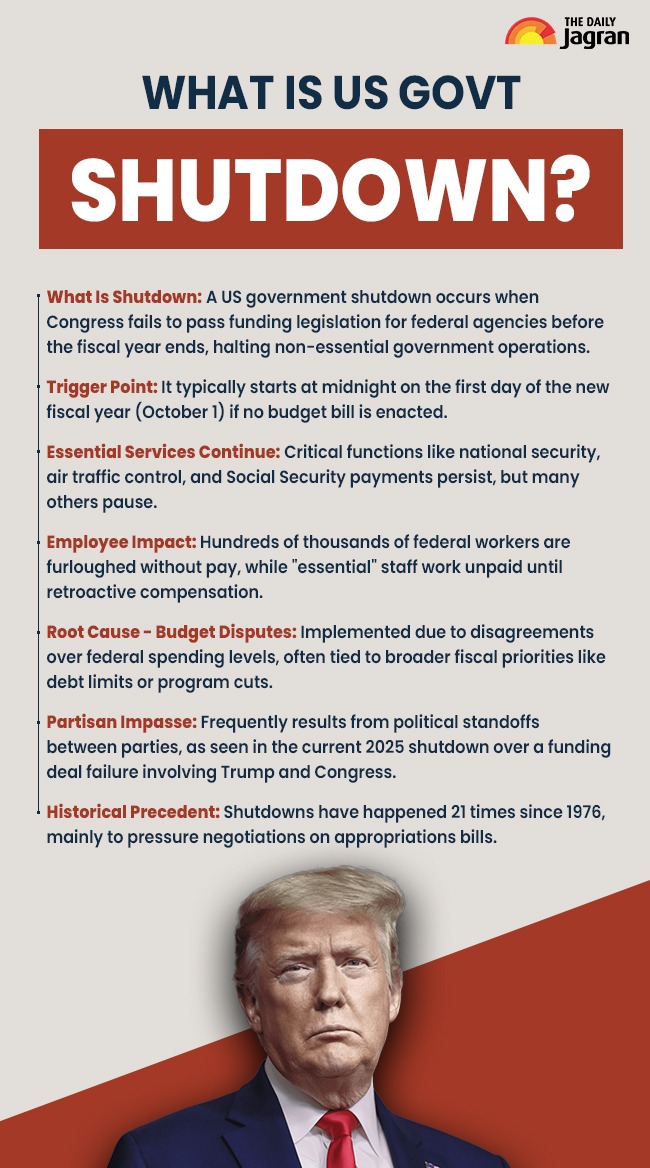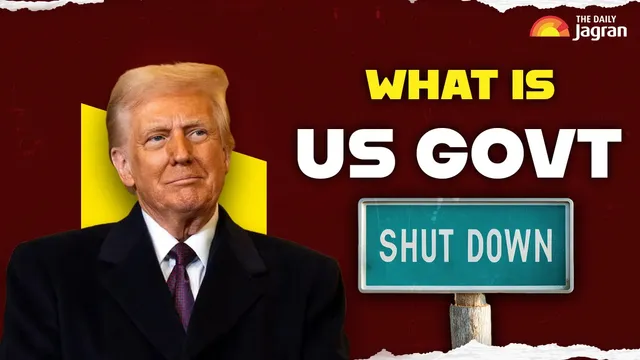- By Ajeet Kumar
- Wed, 01 Oct 2025 12:00 PM (IST)
- Source:JND
US Shutdown News: Washington is bracing for what could be a prolonged federal shutdown after lawmakers deadlocked and missed the deadline for funding the government. Republicans supported a short-term measure to fund the government generally at current levels through November 21, but Democrats blocked it, insisting the measure address their concerns on health care.
They want to reverse the Medicaid cuts in President Donald Trump's mega-bill passed this summer and extend tax credits that make health insurance premiums more affordable for millions of people who purchase through the marketplaces established by the Affordable Care Act. Republicans called the Democratic proposal a nonstarter that would cost taxpayers more than USD 1 trillion. Neither side shows any signs of budging.
Here's what to know about the shutdown that began Wednesday:
What happens in the shutdown?
Now that a lapse in funding has occurred, the law requires agencies to furlough their “non-excepted” employees. Excepted employees, which include those who work to protect life and property, stay on the job but don't get paid until after the shutdown ends.

The White House Office of Management and Budget begins the process with instructions to agencies that a lapse in appropriations has occurred and they should initiate orderly shutdown activities. That memo went out Tuesday evening.
The Congressional Budget Office estimates that roughly 7,50,000 federal employees could be furloughed each day of the shutdown, with the total daily cost of their compensation at roughly USD 400 million.
What government work continues during a shutdown?
A great deal, actually. FBI investigators, CIA officers, air traffic controllers and agents operating airport checkpoints keep working. So do members of the Armed Forces. Those programmes that rely on mandatory spending generally continue during a shutdown. Social Security payments still go out. Seniors relying on Medicare coverage can still see their doctors and health care providers can be reimbursed.
Veteran health care also continues during a shutdown. Veterans Affairs medical centres and outpatient clinics will be open, and VA benefits will continue to be processed and delivered. Burials will continue at VA national cemeteries.
Will furloughed federal workers get paid?
Yes. In 2019, Congress passed a bill enshrining into law the requirement that furloughed employees get retroactive pay once operations resume. While they'll eventually get paid, the furloughed workers and those who remain on the job may have to go without one or more of their regular paychecks, depending upon how long the shutdown lasts, creating financial stress for many families. Service members would also receive back pay for any missed paychecks once federal funding resumes.
ALSO READ: US Government Shutdown Begins As America Faces New Period Of Uncertainty; Big Layoffs Likely To Hit
Will I still get mail?
Yes. The US Postal Service is unaffected by a government shutdown. It's an independent entity funded through the sale of its products and services, not by tax dollars.
What closes during a shutdown?
All administrations get some leeway to choose which services to freeze and which to maintain in a shutdown. The first Trump administration worked to blunt the impact of what became the country's longest partial shutdown in 2018 and 2019. But on Tuesday, Trump threatened the possibility of increasing the pain that comes with a shutdown.
“We can do things during the shutdown that are irreversible, that are bad for them and irreversible by them,” Trump said of Democrats. “Like cutting vast numbers of people out, cutting things that they like, cutting programmes that they like.”
Each federal agency develops its own shutdown plan. The plans outline which workers would stay on the job during a shutdown and which would be furloughed.
Impact on the economy
Phillip Swagel, director of the Congressional Budget Office, said a short shutdown doesn't have a huge impact on the economy, especially since federal workers, by law, are paid retroactively. But “if a shutdown continues, then that can give rise to uncertainties about what is the role of government in our society, and what's the financial impact on all the programmes that the government funds.”
“The impact is not immediate, but over time, there is a negative impact of a shutdown on the economy,” he added.
Markets haven't reacted strongly to past shutdowns, according to Goldman Sachs Research. At the close of the three prolonged shutdowns since the early 1990s, equity markets finished flat or up even after dipping initially.
A government-wide shutdown would directly reduce growth by around 0.15 percentage points for each week it lasted, or about 0.2 percentage points per week once private-sector effects were included, and growth would rise by the same cumulative amount in the quarter following reopening, writes Alec Phillips, chief US political economist at Goldman Sachs.
(With inputs from agency)

